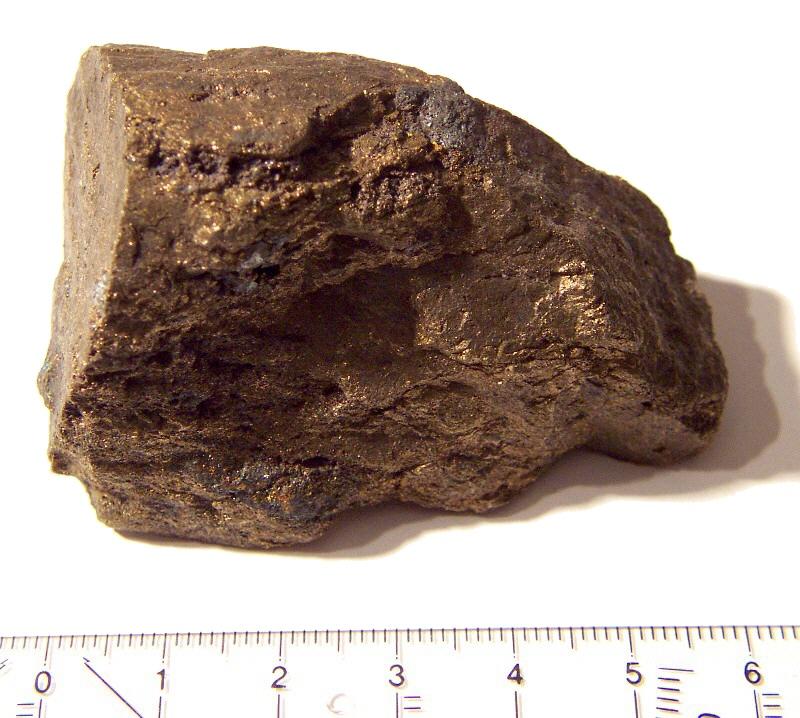Missouri S&T hosts second annual critical minerals workshop
Posted by Nancy Bowles

Renierite, shown here, is a source of germanium, a critical mineral used in transistors. Photo by U.S. Geological Survey.
The future of cell phones, solar panels and electric vehicles depends on materials like cobalt, germanium and rare earth elements. Those and other critical minerals were the focus of the second annual virtual workshop hosted by Missouri S&T Aug. 4-5. The workshop was part Missouri S&T’s critical-minerals workshop series funded by the National Science Foundation. It featured U.S. and international experts on subjects including mineral deposits, critical mineral sustainability, public policy, and processing and recycling.
“Rising gas prices highlight the need for renewable energy technologies, which rely heavily on critical minerals such as cobalt for electric car batteries, tellurium for solar panels, and rare earth elements required for magnets in turbines that harvest wind energy,” says Dr. Marek Locmelis, assistant professor of geosciences and geological and petroleum engineering at Missouri S&T. “To meet the increasing demand for critical minerals and other technological advances that will benefit society, we will have to increase critical mineral supply significantly over the next decade.”
Locmelis, the workshop organizer, says goals can be reached through better exploration models and improved recovery from existing production and recycling. The workshop addressed those challenges and brought together people from different parts of the supply chain to discuss the best ways forward.
Four keynote presenters shared their thoughts during the workshop:
- Michelle Michot Foss, Baker Institute fellow, Rice University
- Jeffrey Mauk, research geologist, United States Geological Survey
- Karin Olson Hoal, the Wold Family Professor of Environmental Balance for Human Sustainability, Cornell University
- Debra Struhsacker, environmental permitting and government relations consultant and professional geologist.
In addition, 12 invited speakers brought a wealth of expertise related to critical minerals:
- Isabel Barton, assistant professor of mining and geological engineering, University of Arizona
- Morgan Bazilian, professor and Payne Institute for Public Policy director, Colorado School of Mines
- Shannon M. Biros, professor of chemistry, Grand Valley State University
- Giovanni Andrea Blengini, associate professor and leader of the life cycle assessment research group, Politecnico di Torino in Turin, Italy
- Brett Carlson, assistant professor of materials and metallurgical engineering, South Dakota School of Mines and Technology
- Sebnem Duzgun, professor and Fred Banfield Distinguished Endowed Chair of Mining Engineering, Colorado School of Mines
- Mahelet Fikru, associate professor of economics, Missouri S&T
- Samuel Kessinger, graduate student in materials engineering, South Dakota School of Mines and Technology
- Hojong Kim, associate professor of material science and engineering, Penn State University
- Lee Ann Munk, professor of geological sciences, University of Alaska Anchorage
- Kristin Vekasi, associate professor of political science, University of Maine
- Eric J. Werner, professor of chemistry, University of Tampa.
Presentations addressed several topics, including workforce development, global supply chains, domestic mineral exploration, sourcing and production, governance, and sustainability. Participants had the opportunity to ask questions and further discuss the topics with the speakers. Over 150 unique viewers attended the first day of the workshop and over 110 attended the second day.
In addition to Locmelis, workshop organizers included Dr. Lana Alagha, associate professor of mining engineering; Dr. Kwame Awuah-Offei, chair of mining and explosives engineering; Dr. Mark Fitch, assistant chair and associate professor of civil, environmental and architectural engineering; Dr. Alanna Krolikowski, assistant professor of history and political science; Dr. Michael Moats, professor and interim chair of materials science and engineering at Missouri S&T; Dr. Angela Lueking, vice chancellor for research and dean of the graduate school at Montana Technological University; and Shelby Clark, a graduate student in geology and geophysics at Missouri S&T. The workshop was hosted by Missouri S&T’s Energetic Materials, Rock Characterization and Geomechanics Research Center.
About Missouri University of Science and Technology
Missouri University of Science and Technology (Missouri S&T) is a STEM-focused research university of over 7,200 students. Part of the four-campus University of Missouri System and located in Rolla, Missouri, Missouri S&T offers 101 degrees in 40 areas of study and is among the nation’s top 10 universities for return on investment, according to Business Insider. S&T also is home to the Kummer Institute, made possible by a $300 million gift from Fred and June Kummer. For more information about Missouri S&T, visit www.mst.edu.
Leave a Reply